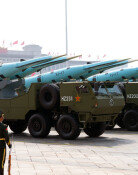War Expenditure Estimated over 100 Billion Dollars
War Expenditure Estimated over 100 Billion Dollars
Posted October. 10, 2001 09:07,
As the United States began to strike Afghanistan and also alluded to expanded warfare against enemy nations, the question of how U.S. would raise funds for war estimated at astronomical figures became the center of interest.
▽ War Expenditue== The U.S. Congress approved 40 billion dollars in emergency spending for recovery and anti-terrorist initiatives on Sept. 19. The half, 20 billion dollars, are found to be spent as war expenditure. Specialists calculate that the war expenditure will reach 50 billion dollars, equivalent to two-thirds of 72 billion dollars spent at the Gulf-War, if the war continues for a month.
The early expenditure of this war appears to be relatively low because, unlike the Gulf-War where massive military forces were deployed, only ten of thousands of ground troops and five hundred aircrafts are supposed to be deployed. However, the New York Times analyzed on Oct. 8 that the war expenditure may exceed 100 billion dollars for it may take years to accomplish the goal to eradicate the terrorist organizations, and if the aid spending for Afghan refugees is included.
▽ How to Raise Funds==Out of total spending of 72 billion dollars on Gulf-War, the United States accounted for less than 20 billion dollars. The remaining 50 billion dollars were borne by allied countries. Even Korea bore about 500 million dollars. But the world economic slump has made it difficult for Europe and Japan to readily share in the spending. In addition, it seems unlikely that Kuwait, Saudi Arabia and other nations that provided 30 billion dollars during the Gulf-War will be willing to support the U.S. Thus, the U.S. has to raise its own share, and in this case, to raise government expenditure will be an option.
But what concerns the U.S. administration is that it is not easy to raise government expenditure because it is running out of finance. The U.S. finance that enjoyed surplus spending for last three years is now found to mark a 9 billion dollar deficit this year due to an economic recession.
Even if the U.S. administration is considering to divert surplus funds assigned for social security and medical insurance to war expenditure, it can hardly do so because it is expected to face an objection from the Democratic Party, forecasted the New York Times.
Former White House economic adviser during the Clinton Administration and Berkeley Business School Dean Laura Tyson advised ``The Bush Administration has to consider to raise the finances by retracting the 1,800 billion dollar tax reduction policy.
mickey@donga.com







